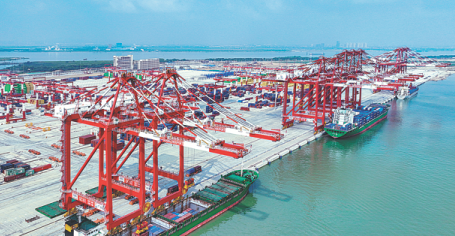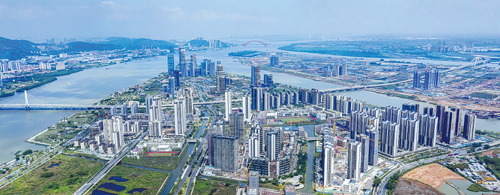Making all the right connections across the world
The port of Nansha has played an important role in connecting the district in South China's Guangdong province with the rest of the world.
With the increasing number of liner routes, the port is improving its facilities to meet the growing demands of the local economy.
It saw the addition of 13 foreign trade container routes in the first half of this year, bringing the total routes to 180, including 148 foreign trade lanes, according to the official figures. These routes connected with major economies across the world.
A fully automated terminal, the first of its kind built in the Guangdong-Hong Kong-Macao Greater Bay Area, began operations at Nansha port on July 28.
As a part of the fourth phase of the modernization of Nansha port, the new terminal features smart and independent operations and low-carbon emissions. It combines multimodal services related to sea, river and rail transportation in the area.
The new terminal, with four 100,000-deadweight-tonnage berths, raised the annual container throughput of the entire Nansha port to exceed 24 million twenty-foot equivalent units.
Meanwhile, the port continues to invest in an international terminal for common purpose and its fifth construction phase.
It has put five automobile ro-ro berths into operation and plans to build a new wharf capable of handling the biggest vehicle export throughput in the country.
"Nansha enjoys top-level logistic infrastructure and provides highly efficient customs services," said Li Jinling, CEO of Guangdong Top Ideal Group.
The company, which focuses on cross-border e-commerce, started operations of its logistics center at Nansha port area this year.
Li said the port can cut logistical costs for companies-which is now becoming an emerging center for the cross-border trade of milk powder, healthcare products and cosmetics-by taking the spillover logistics demand from Asia-Pacific regions.
Official figures showed that the import and export of cross-border e-commerce at Nansha port amounted to roughly 36 billion yuan ($5.3 billion) in 2021, up 70 percent year-on-year.
Hu Gang, a professor of economics at Guangzhou-based Jinan University, said Nansha district has an opportunity to build a supply chain platform for bulk raw materials, consumer goods, food and artworks for the Greater Bay Area.
The port of Nansha was given more functions in the newly-issued overall plan for Nansha district to increase comprehensive cooperation between Guangdong province and the Hong Kong and Macao special administrative regions by the State Council in June, Hu said.
"The plan puts much emphasis on developing an international hub for shipping and logistics, Nansha obviously has more premier resources," he said.
He suggested the district strengthen cooperation with Hong Kong and Macao in marine services and consolidate shipping service resources in the Greater Bay Area.
chenhong@chinadaily.com.cn













